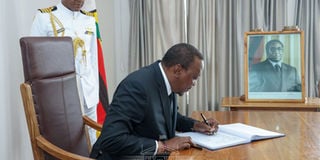Uhuru joins African leaders to pay tribute to Mugabe

President Uhuru Kenyatta signs a condolence book during the funeral of former Zimbabwe President Robert Mugabe in Harare on September 14, 2019. PHOTO | PSCU
What you need to know:
- South African President Cyril Ramaphosa and a dozen current and former African leaders are expected to attend the funeral at a Harare sports stadium.
- But his final burial at a national monument will only happen after a new mausoleum is built, his family said.
- African leaders and officials from Cuba, Russia and China all praised Mugabe as a pan-African hero for his past as a colonial-era guerrilla leader.
President Uhuru Kenyatta joined other African leaders in Harare on Saturday for the State funeral of former Zimbabwe President Robert Gabriel Mugabe. The funeral was held at the National Sports Stadium in the capital city.
President Kenyatta eulogised the former Zimbabwean leader as an icon of Africa's liberation struggle and an elder statesman who relentlessly championed for African dignity.
In honour of the late Mugabe, he called on African leaders to guard against negative influences and manipulation that erode common values and aspirations for socioeconomic emancipation and prosperity.
Mugabe, who died last week in Singapore aged 95, left Zimbabwe torn over the legacy of his 37-year rule marked by brutal repression and economic crisis.
LOYALISTS
Mugabe, who died in Singapore last week aged 95, left Zimbabwe deeply divided over his legacy with his country still struggling with high inflation and shortages of goods after decades of crisis.
He died on an overseas medical trip almost two years after former army loyalists forced him out in 2017, following a power struggle over what was widely perceived as a bid to position his wife Grace as his successor.
Former and current African leaders, including South Africa's Cyril Ramaphosa and President Kenyatta, arrived to crowds chanting and drumming liberation songs at the less than half-filled 60,000-seat national stadium in Harare.
Mugabe's casket, draped in the green, black, gold and red Zimbabwe flag, was marched slowly into the stadium, accompanied by a military band and an escort of officers. His wife Grace, in a black veil, and family followed behind.
African leaders and officials from Cuba, Russia and China all praised Mugabe as a pan-African hero for his past as a colonial-era guerrilla leader.
"We honour and remember our African icon. He had many allies and followers... Our motherland is in tears," Zimbabwe President Emmerson Mnangagwa said.
JEERS
South African leader Ramaphosa's speech was briefly interrupted by jeers and whistles from the crowds until he apologised for recent xenophobic attacks on African migrants, including Zimbabweans, in Johannesburg.
Mugabe's final burial at a national monument will only happen after a new mausoleum is built in about 30 days. That decision was taken after his family ended a dispute with Mnangagwa, a former ally who turned against his rule in 2017.
Mugabe's body was returned from Singapore on Wednesday to a country he helped found as an anti-colonial rebel who helped end white-minority rule.
Later, Mugabe turned to repression and fear to crush dissidents and govern for nearly four decades during which he become an international pariah for his takeover of white-owned farms.
"You can't talk about Zimbabwe without Bob. Zimbabwe is Bob. It took a man like Bob, his bravery, to get independence," said Norman Gombera, 57, a school principal in Harare. "Bob did his best under the circumstances. There is no country without a problem."
JAILED
A young Mugabe was once jailed in the former British colony Rhodesia for his nationalist ideas. But he swept to power in the 1980 elections after a guerrilla war and sanctions forced the Rhodesian government to the negotiating table.
In office, he initially won international praise for promoting racial reconciliation and for extending improved education and health services to the black majority.
But he soon turned to the repression and fear that would mark his regime for decades.
Though still lauded as an African icon, at home many Zimbabweans will remember Mugabe more for the increasingly tyrannical rule and economic mismanagement that forced millions to flee the country during decades of crisis.
Many are struggling to survive despite Mnangagwa's vows of more investment and jobs in the post-Mugabe era.
"The fruits of his tenure are the shortages. That is what we remember him for," said Steven, a consultant shopping near the stadium.
"He has made sure there is no opposition and he succeeded. There is no reason to go to his funeral."
Always divisive in life, Mugabe's funeral arrangements were also caught up in a dispute between Mnangagwa and the family over where and when the former leader should be buried.
HEROES
The two parties on Friday finally agreed he should lie at National Heroes Acre monument. But the final ceremony would take place in about 30 days, once the new mausoleum was built for him there.
The "heroes" monument, where more than 130 national figures are buried in black marble tombs, sits on a hilltop overlooking Harare. Mugabe's first wife, Sally, is also buried there.
His family are still bitter over the role Mnangagwa played in his ouster and had pushed for Mugabe to be buried in his homestead of Zvimba, northwest of Harare.
A former guerrilla who fought alongside Mugabe against colonial forces, Mnangagwa was fired as first vice president by Mugabe in 2017. Mugabe had branded him a "traitor".
Soon after, protesters took to the streets and military officers pressured Mugabe to step down in what was widely seen as a struggle between Mnangagwa's faction and loyalists to Mugabe's wife Grace inside the ruling ZANU-PF party.
Additional reports by Joel Odidi





